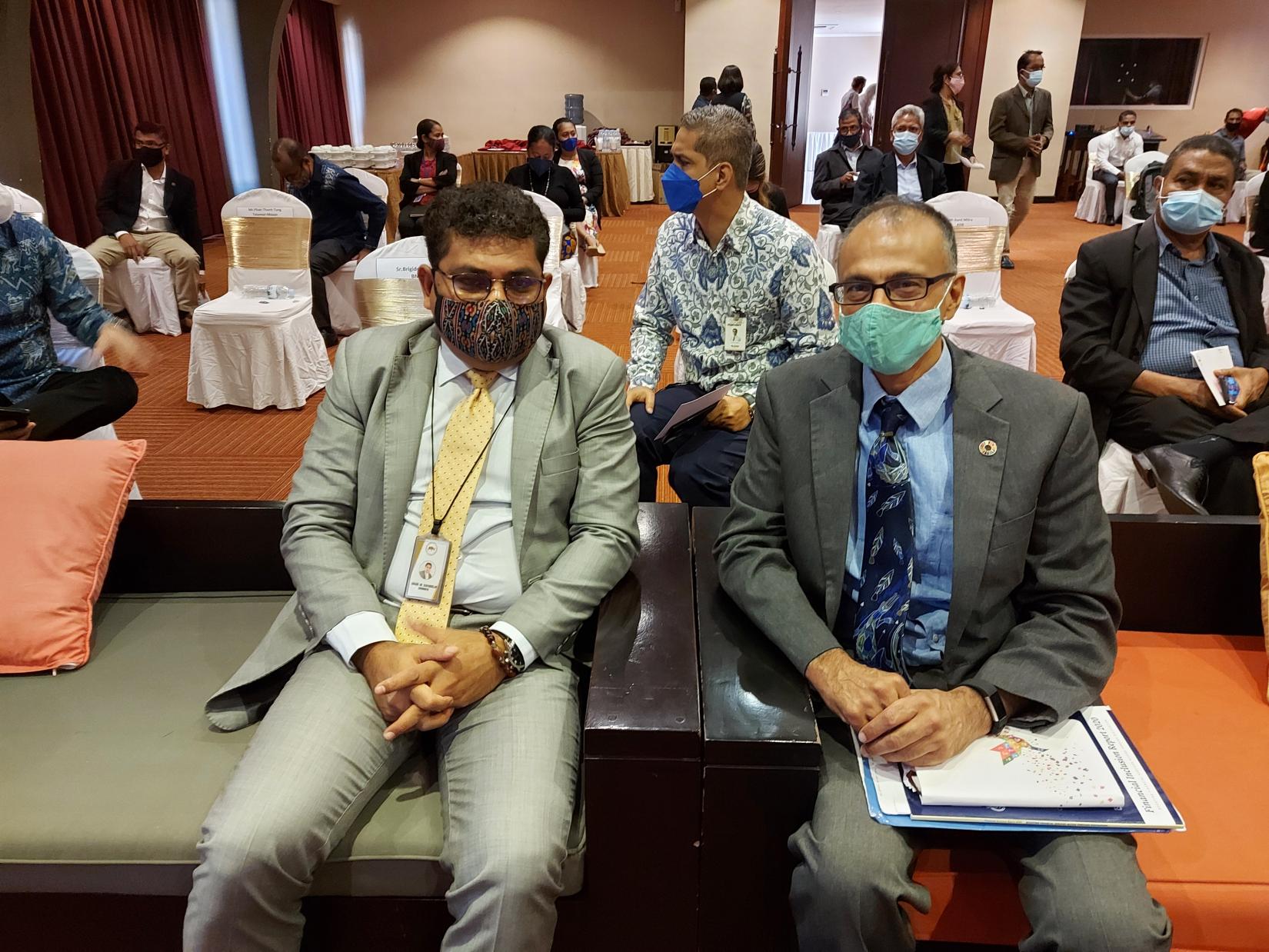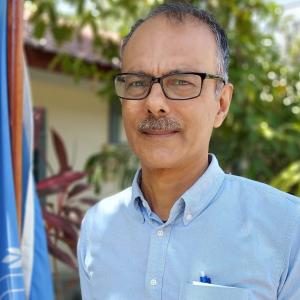UN RESIDENT COORDINATOR ROY TRIVEDY AT LAUNCHING CEREMONY OF TIMOR-LESTE FINANCIAL INCLUSION REPORT 2020
The Banco Central de Timor-Leste (BCTL) launched the “Financial Inclusion Report 2020 – Boosting Financial Services Access through Digitization”.

[As delivered]
Governor Abraao De Vasconselos, staff of the BCTL and all Distinguished guests thank you
for inviting me to join in the launch of the Timor-Leste Financial Inclusion Report 2020 and for allowing me to make a few remarks this morning.
I would like to start by Congratulating the Central Bank of Timor-Leste and all the partners who have been involved in preparing this publication. This third Financial Inclusion Report shows the strong progress that has been made in Timor-Leste over the past two years. The Report contains updated information about the supply of financial services in the country and summarizes the results of the ‘demand’ for financial services from different groups of people in the country.
The Report brings together in one place a lot of vital information about financial services in the country – what has been achieved and areas where further progress is required. I want to convey my appreciation and thanks to everyone involved in putting together this very informative and elegant report.
I would like to focus my remarks on the progress that has been achieved and areas where I think it may be useful for us to dig deeper to make further and faster progress on financial inclusion in Timor-Leste. However before coming to that, I would like to share with you a bit about my personal interest in financial inclusion and my experience of why it matters.
My family emigrated to the UK from Kenya when I was around 10 years old. My father was a trained accountant and worked as a Company Secretary. My mother was aged around 40 years when we moved from Kenya. Before we arrived in the UK my mother had always worked at home as a ‘housewife’ she spoke very little English and had missed most of her schooling (because of early marriage).
When we moved to the UK, my family could not live easily on just my father’s salary and so my mother had for the first time in her life find formal employment. At that time in the late 1960s and early 1970s it was possible to find ‘low skilled’ jobs in factories where we lived. My mother therefore started working in a local factory. Initially for the first 5 years, each Friday my mother used to handover her week’s earning to my father (who would manage the family’s finance) and in return my father would give some of the cash back to my mother so that she could purchase food and other items that the family needed. After several years of this, it soon became apparent to all of us that despite my father and mother’s earnings, the family was not able to build up any significant savings. It was at that time that my brother and I (both in our teens) persuaded my mother to open a Building Society account. Initially, my father was very displeased about why my mother had opened a separate account – he argued very strongly for continuing the practice of having just one bank account for the family (that he controlled). But with the support of her children my mother kept the account and rather than handing over all her weekly wage to my father, started saving part of her earnings. Many years later, my father was the first to admit that my mother had done the right thing. She managed to save thousands of pounds and used her savings to support the family… This experience helped change my family’s economic situation and that experience of opening a bank account (or Building Society account) was instrumental in shaping my commitment to the issue of financial services. That is why I am a passionate supporter of financial services. I believe they can not only support the development of individuals and families but also contribute to the development of nations!
So what does this Report tell us? Firstly it makes the point that understanding market dynamics and client needs is essential for financial inclusion. People won’t use digital services if they do not understand those services or the services are too expensive.
Different groups of people have different needs. Women and young people have different financial needs to men and retired people, so will require different financial products. Those living here in Dili will have different needs in turn to those living in rural areas. So financial service products need to be adapted to respond to the very specific needs of clients in the country.
Without a nuanced understanding of the demand for financial services, it’s difficult to create the right savings, credit, insurance or payment products that meet people’s needs and help them improve their lives or grow their businesses, and achieve their goals.
So one of the values of this Report is that it helps government and other service providers gain a better understanding of the needs of Timorese people with regard to financial services and products. The Report provides vital information on access, usage and quality of the financial services and products currently available.
The Report highlights several important facts that can now be used by stakeholders to plan their future actions in accelerating financial inclusion in the country such as:
- The significant improvements on access points: increased coverage in Sucos, and for the first time, all Administrative Posts (states) are covered by at least one type of financial service access point;
- The impressive growth of e-wallet services with more than 3,000 agents and 86,000 registered clients in 2020;
- The modernization of the National Payments System: interoperability of ATMs and connect e-wallet services to banks, allowing clients to transfer money from bank accounts through their e-wallet accounts;
- The moderate increase in usage of bank services;
- The implementation by Timorese Government and the BCTL of a Credit Moratorium Program in 2019 to support the economy and in particular businesses and households affected by the COVID-19 outbreak.
- The launch by BCTL of “Digital Village” awareness campaign to promote digital financial services among Timorese in rural and urban areas.
Additionally, the Report makes good use of data gathered during as part of the first ever demand side survey in the country, conducted by BCTL with support from The Asia Foundation.
The Report makes clear that there are many positive things here for us all to build on. The global experience shows that good financial services are essential for the development of economies and can contribute to the wellbeing of families regardless of where people live or which sectors of the economy they work in.
The Report also makes a very important point about the need to improve financial literacy in Timor-Leste. Despite the fact that about 64% of Timorese adults, overwhelmingly salaried employees, own an account with a formal financial institution (banks, ODTIs). Due to lack of awareness and knowledge a large proportion of Timorese are unable to access formal financial services that meet their needs and provide them means to create sustainable livelihoods opportunities, making better choices, taking better decisions in investment, food security, health outcomes and other aspects of their daily life.
The Report shows that more efforts are needed to focus on digital and financial literacy and customer awareness in terms of products, services, and eligibility criteria to improve access to formal financial services. This suggests that there is scope for service providers to step up their financial literacy programmes and focus on customer education, making it an integral part of their outreach strategies. But its also points to BCTL’s role as an initiator and coordinator of digital and financial literacy programmes in the country to ensure an effective and efficient approach.
Ultimately, the promotion of financial inclusion is a collective responsibility. Government plays an important role in regard to creating a favourable enabling environment; the private sector plays an important role through technological innovation and tailored business models; development partners have a role in emphasizing the importance of access to finance through their engagements; and civil society plays a role by providing support, knowledge and oversight.
I hope this report will bring together these various stakeholders in accelerating access to financial services in Timor-Leste.
The UN family, and particularly dedicated agencies such as UNCDF, stand ready to work together with the Government and Central Bank of Timor-Leste, and indeed all partners to help achieve BCTL’s financial inclusion vision “To create an inclusive financial system that brings the benefits of financial services to all, including unbanked people and communities, towards the objectives of reducing poverty and enhancing shared prosperity”, and help achieve the country’s SDGs objectives.
Thank you
Speech by


















